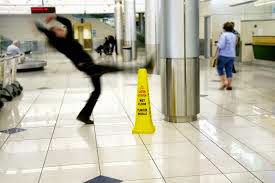In giving the value to a property owner's
level of Reasonable Conduct, the law relies on whether the property owner makes
regularly scheduled and painstakingly careful efforts to make the property safe
and fresh.
Here are a number of early things you can ask to decide whether a
property or company owner might be responsible for your slip and fall accident:
· When you missed a step and fallen over an old, broken, or outward curving
area of carpet, floor, or slid on a sopping or free area, the unsafe object had
been there for such long time that the owner should have informed about it?
· Does the property owner adopt a regularly scheduled step for checking out
and cleaning or fixing the premises? If it is the matter, what evidence does
the owner establish about this usual maintenance?
· When you missed a step and fallen over or slid on a thing somebody
had put or leaved on or in the floor or ground, were there a reasonable cause
for the things to be present?
· When there one time had been a reasonable cause for the thing to be
present but that reason does not exists any more, could the thing have been moved
out or covered or in other way made harmless?
· Was there any place free from danger, the thing could have been
placed there, or could it have been replaced in a way causing not any danger,
without much greater problem or cost to the property owner?
· Could a small barrier have been made or a caution notice been posted
to prevent the occurrence of slipping or tripping?
· Did damaged or poor lighting lead to the injuries?
When the answers to a few of above
questions appear in your good turn, you may have a powerful claim to be
submitted in court for getting compensation. On the other hand, you must still
consider whether you acted in careless way any time, directed to any main way
to your accident.
Your careless conduct
In more or less each slip and fall case,
you have to come to a decision whether your careless conduct directed to the accident.
The regulations of "comparative negligence" help find your own level
of reasonable performance performing wherever you did, the way you did in, on
the way to the accident took place.
There are a few things you should find
about yourself and your own level of reasonable behavior - an insurance claim
agent will ask them in all probability following you submit your claim.
· Were there being some reasonable causes - causes the owner should
have expected - for being wherever the unsafe location was?
· Would a wise person have observed the unsafe spot and cleared it, or
walked with enough care to avoid slip and fall?
· Was there any caution signboard that something might be hazardous?

